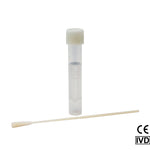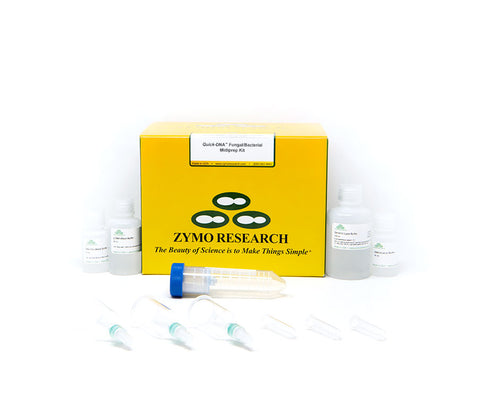Successfully Added to Cart
Customers also bought...
-
 DNA/RNA Shield (50 ml)Cat#: R1100-50DNA/RNA Shield reagent is a DNA and RNA stabilization solution for nucleic acids in any biological sample. This DNA and RNA stabilization solution preserves the...
DNA/RNA Shield (50 ml)Cat#: R1100-50DNA/RNA Shield reagent is a DNA and RNA stabilization solution for nucleic acids in any biological sample. This DNA and RNA stabilization solution preserves the... -
 DNA/RNA Shield SafeCollect Swab Collection Kit, 1ml (1 collection kit)Cat#: R1160The DNA/RNA Shield SafeCollect Swab Collection Kit is a user-friendly collection kit for stabilizing the nucleic acid content of samples collected with a swab. DNA/RNA Shield completely inactivates harmful pathogens...
DNA/RNA Shield SafeCollect Swab Collection Kit, 1ml (1 collection kit)Cat#: R1160The DNA/RNA Shield SafeCollect Swab Collection Kit is a user-friendly collection kit for stabilizing the nucleic acid content of samples collected with a swab. DNA/RNA Shield completely inactivates harmful pathogens...
Quick-DNA Fungal/Bacterial Midiprep Kit
D6105

Highlights
- Boost Detection: Included BashingBeads ensure complete lysis of tough-to-lyse samples.
- Ultra-Pure: Ready for qPCR, Next-Gen Sequencing, arrays, etc.
- Simple: Fastest workflow (≤ 20 minutes).
Description
| Applicable For | All sensitive downstream applications such as qPCR and Next-Generation Sequencing. |
|---|---|
| Elution Volume | ≥ 150 µl |
| Equipment | Centrifuge, Vacuum Source and Manifold, Microcentrifuge, Cell Disrupter/Pulverizer w/ 50 ml Tube Adapter |
| Processing Time | ≤ 20 minutes |
| Processing Volume | ≤ 500mg fungi or bacteria (wet weight), 5x109 bacterial cells, 5x108 yeast cells, or 5x107 mammalian cells |
| Purity | Typical A260/A280 & A260/A230 ≥ 1.8 |
| Sample Source | Fungal and bacterial cell cultures, spores, pollen, nematodes, as well as other microorganisms can also be sampled. |
| Size Range | Capable of recovering genomic DNA up to and above ≥40 kb. Typical fragment sizes range from 25 to 35 kb. If present, parasitic and viral DNA will also be recovered. |
| Type | Total DNA |
| Yield | ≤ 125 µg total DNA |
Q1: Are there any tips in optimizing bead beating conditions?
We have validated our kits with both high-speed homgenizers and low-speed disruptors. We highly recommend users to optimize their bead beating conditions for their own instruments. We recommend using a 50 ml-tube adapter to ensure that the bead beating is efficent (do not use adapters made of foam). For high-speed homogenizers, we recommend a total of 5 mins bead beating (1 min interval at 6.5 m/s with 5 mins rest, repeat 5 times). For low-speed cell disruptors, we recommend 30 mins at max speed.
Q2: My lysate seems viscous. What is causing this to happen? How can I fix this?
A viscous sample can indicate incomplete sample lysis. Try using less of your sample and optimize bead beating conditions (duration, speed, time) to ensure samples are thoroughly lysed. After bead beating, pellet the cell debris before moving on. Adding more Genomic Lysis buffer to the lysate can help dilute and deproteinate the sample, making the sample less viscous and more suitable for DNA recovery.
Q3: Is it necessary to add beta-mercaptoethanol? Can this step be substituted or omitted?
Addition of beta-mercaptoethanol is recommended to enhance sample lysis, but can be substituted with dithiothreitol (DTT, final concentration of 10 mM). However, if bead beating is optimized and lysis is efficient, the addition of BME is not necessary and can be omitted.
Q4: When can an RNase A treatment be implemented in the protocol?
No additional RNase A treatment is required when processing samples within kit capacity. The selective chemistry allows for binding of double stranded DNA to the column and for RNA to flow through.
| Cat # | Name | Size | Price | |
|---|---|---|---|---|
| D3004-1-100 | Genomic Lysis Buffer | 100 ml | €71,30 | |
| D3004-2-50 | g-DNA Wash Buffer | 50 ml | €21,40 | |
| D3004-4-16 | DNA Elution Buffer | 16 ml | €21,40 | |
| D3004-5-15 | DNA Pre-Wash Buffer | 15 ml | €11,90 | |
| C1001-50 | Collection Tubes | 50 Pack | €17,90 | |
| C1021-25 | ||||
| S6010 | ZR BashingBead Lysis/Filtration Tubes w/ 0.5 mm Beads (50 ml) | 25 Pack | €226,90 | |

